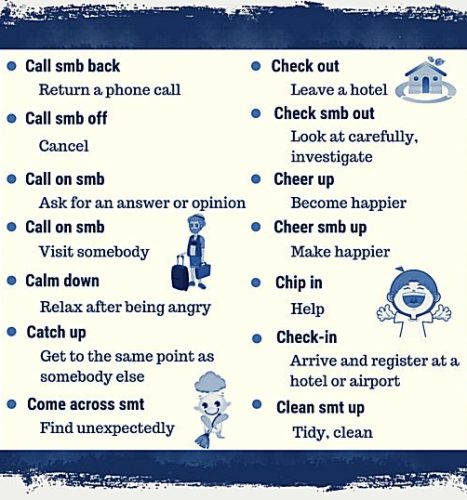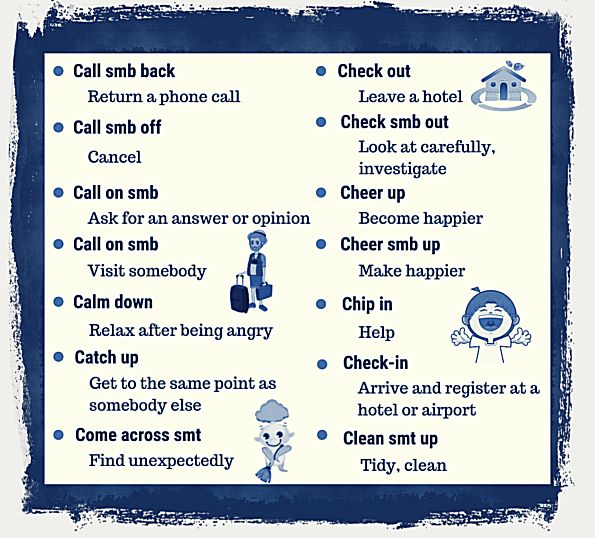
English phrasal verbs, an analysis of this important aspect of the language with rules and examples, plus some useful links to free dictionaries and PDF files.
In English traditional grammar, a phrasal verb is a combination of a verb and a preposition, a verb and an adverb, or a verb with both an adverb and a preposition, any of which are part of the syntax of the sentence, and so are a complete semantic unit. Sentences, however, may contain direct and indirect objects in addition to the phrasal verb. Phrasal verbs are particularly frequent in the English language. A phrasal verb often has a meaning which is different from the original verb to form a single semantic unit on a lexical or syntactic level.
Examples: common short verbs like bring, come, do, get, give, go, have, keep, make, put, and take are very often used with prepositions or adverb particles (e.g. on, off, up, away) to make two-word verbs. These are called “prepositional verbs” or “phrasal verbs”, and many of them are idiomatic.
Can you look after the cats while I’m away?
She just doesn’t know how to bring up children. I gave up chemistry because I didn’t like it.
Many of these two-word verbs are especially common in informal speech and writing.
Compare:
What time are you planning to turn up? (informal)
Please let us know when you plan to arrive. (more formal)
Just keep on till you get to the crossroads. (informal)
Continue as far as the cross roads. (formal)

There are tens of thousands of them, and they are in everyday, constant use. These semantic units cannot be understood based upon the meanings of the individual parts alone, but must be taken as a whole. In other words, the meaning is non-compositional and thus unpredictable. Phrasal verbs that include a preposition are known as prepositional verbs and phrasal verbs that include a particle are also known as particle verbs. Additional alternative terms for phrasal verb are compound verb, verb-adverb combination, verb-particle construction, two-part word/verb or three-part word/verb (depending on the number of particles) and multi-word verb.
According to Tom McArthur the term “phrasal verb” was first used by Logan Pearsall Smith, in “Words and Idioms” (1925), in which he states that the OED Editor Henry Bradley suggested the term to him. Alternative terms for phrasal verb are “compound verb”, “verb-adverb combination”, “verb-particle construction (VPC)”, AmE “two-part word/verb” and “three-part word/verb” (depending on the number of particles), and multi-word verb (MWV).
“Preposition” and “adverb” as used in a phrasal verb are also called “particle” in that they do not alter their form through inflections (are therefore uninflected, they do not accept affixes, etc.).
It is, however, the figurative or idiomatic application in everyday speech which makes phrasal verbs so important:
“I hope you will get over your operation quickly.”
“Work hard, and get your examination over WITH.”
The literal meaning of “to get over”, in the sense of “to climb over something to get to the other side”, no longer applies to explain the subject’s enduring an operation or the stress of an examination which they have to overcome. It is when the combined meaning of verb plus adverb, or verb plus preposition is totally different from each its component parts, that the semantic content of the phrasal verb cannot be predicted by its constituent parts and so becomes much more difficult for a student learning English to recognise.
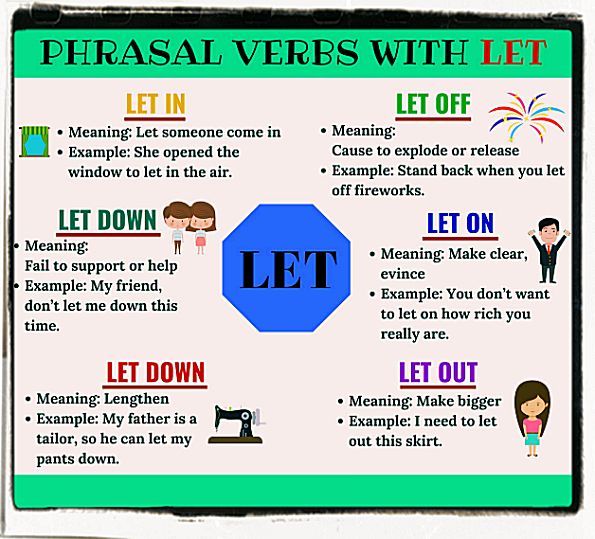
“To get over an examination” is not the correct application of the phrasal verb “to get over.” The author wants to imply, “to finish,” the phrasal verb in this case is “to get over with.” To get over the examination means put it in your emotional past. See more phrasal verbs in English
Phrasal verbs are differentiated from other classifications of multi-word verbs and free combinations by criteria based on idiomaticity, replacement by a single-word verb, wh-question formation and particle movement.
Adverb particles often join together with verbs to make two-word verbs, sometimes with completely new meanings (e.g. break down, put off, work out, give up ). These are often called “phrasal verbs”. Note that, unlike most other adverbs, adverb particles can come just before the object of a verb.
Could you switch off the light?
So, let’s see other examples of verbs with prepositions and particles, two-word verbs, since we have just known that many English verbs can be fallowed by prepositions or adverb particles.
Alan walked down the road without looking at anybody. Do sit down.
Some verbs with prepositions and particles are regularly used together: far example look at, listen to, stand up, switch ojf. These combinations are rather like two-word verbs. They are often called “phrasal verbs” in grammars. The meaning of a two-word verb is sometimes very different from the meanings of the two parts taken separately.
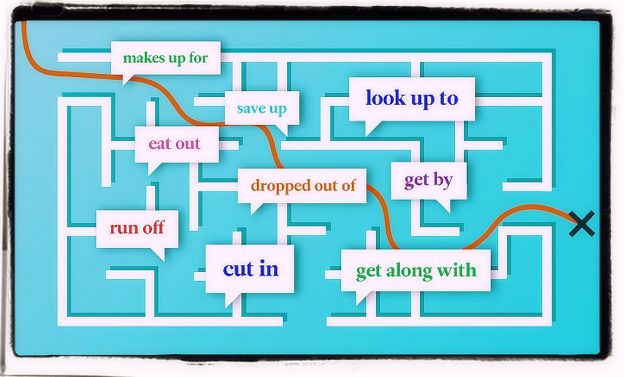
Could you look after the kids while I’m out?
( Look after is not the same as look + after.) We had to put off the meeting till Tuesday.
(Put off is not the same as put + off.) verbs with prepositions and particles together
Some verbs can be used with both an adverb particle and a preposition.
I get on with her quite well.
If you’re on the road on Saturday night, look out for drunk drivers.
Word order with objects
Prepositions and particles do not always go in the same place in clauses with objects. Prepositions normally go before objects.
He fell off the bridge. (NOT He fell the bridge off.)
Particles can go before or after noun objects.
She switched off the light. OR She switched the light off.
But particles can only go after pronoun objects. She switched it off. (NOT She switched off it.) ls that the light which you switched off? NOT … the light off which I switched?)
Give me back my watch. OR Give me my watch back. (NOT Give back me my watch.)
Objects at the beginning of clauses
When an object comes at the beginning of a clause (e.g. in a question or relative clause), a two-word verb usually stays together, so that a preposition can be separated from its object and go at the end of the clause. For details of this and other preposition-final structures.
What are you thinking about? (Not About what are you thinking?)
I’ve found the book which I was looking for.
(More natural in an informal style than … the book for which I was looking.)
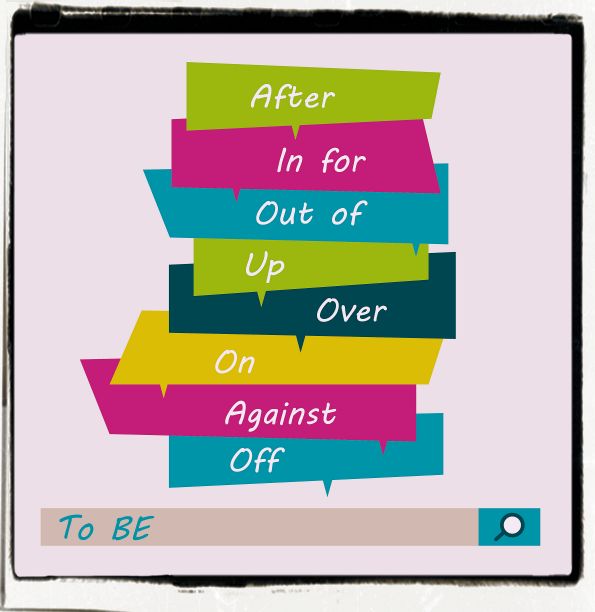
Stress
At the end of a clause, a preposition is usually unstressed, while an adverb particle is usually stressed.
Compare:
They were called on. (preposition)
They were called up. (particle)
Idioms and collocations
Other idiomatic usages of phrasal verbs show a verb + direct object + preposition/adverb + indirect object construction: In her introduction to “Longman Dictionary of Phrasal Verbs, What this dictionary contains”, Rosemary Courtney includes as a third category, that is:
Idioms which are formed from phrasal verbs, such as let the cat out of the bag. These idioms are printed in heavy type. Idioms have a meaning which is different from the meaning of the single words, and usually have a fixed word order.
Courtney then cites among many other examples in the dictionary such phrases as “to add insult to injury”, “to add fuel to the flames”, “to leave someone in the lurch”, “to scare someone out of their wits”, etc.
An expression like turn up (meaning “arrive”), break even (meaning “make neither a profit nor a loss”) or a can of worms (meaning “a complicated problem”) can be difficult to understand, because its meaning is different from the meanings of the separate words in the expression. (If you know break and even, this does not help you at all to understand break even.) Expressions like these are called “idioms”. Idioms are usually special to one language and cannot be translated word far word (though related languages may share some idioms).
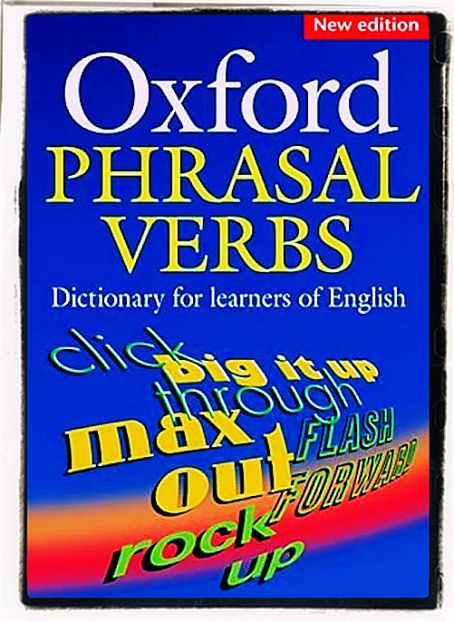
Collocation is a grouping of familiar words that seem to belong together because of their continual use and thus creating a coherent meaning. Suppose, it is said heavy rain instead of big or strong rain conveys the implication that it is raining heavily. “Strong rain” or “big rain” offers the same meaning, in the collocation example mentioned above. Also, both of them are grammatically correct, but the utilization of big rain or strong rain will sound outlandish. Thus, we use heavy rain for better English. There are various examples where we use a specific set or group of words to make it sound a natural fit. Collocation can also be defined as a group of words that are expected to be together. Some more instances of collocations are “to do homework”, “to make the bed”, “to take a risk”, etc.
For details of particular two-word verbs, see the Oxford Dictionary of Phrasal Verbs Volume l, or the
Longman Dictionary of Phrasal Verbs. (free book downloadable on archive.org)
Phrasal verbs dictionary online
Main phrasal verbs with Italian translation
For details about Idioms you can read the following article:
For details about Collocations you can explore these links:
English collocations words (Article on this blog)

